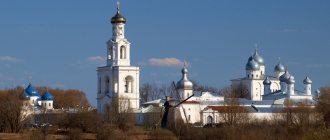How to say in Tatar May the earth rest in peace?
Translation of “may he rest in peace” into the Tatar language: “ana җir shary sunsen”
| let be: | әйдә |
| Earth: | Hir Tufrak Balchyk |
| to him: | St. |
| will: | Bulachak |
| rest in peace: | mamik |
Interesting materials:
Why doesn't the water bag light up? Why don't penguins freeze in cold water? Why is the density of ice less than the density of liquid water? Why does the water not pour out while the edges of the glass are under water? Why is landing a plane on water dangerous? Why does the water come out of the pipes dirty after turning it off? Why does the volume decrease when mixing alcohol and water? Why does ice expand when water freezes? Why are air bubbles in water silvery? Why don't fish drown in water?
The Kingdom of heaven!
“The Kingdom of Heaven and Eternal Peace!” Expressions of condolences by Orthodox Christians, epitaphs and prayers at funerals. How to speak and write correctly?
According to Orthodox beliefs, the first forty days after death the soul of the deceased:
- has been among us for three days,
- then, until the 9th day, he gets acquainted with the Paradise,
- after which he goes through severe trials and ordeals.
On the 40th day, the soul of the deceased appears before God's judgment. The Lord decides the fate of where the soul will be - in Heaven or Hell (for more details: “The soul of the Orthodox after death”).
Prayers for the repose of the soul and appeals to the Lord for forgiveness help the deceased. Therefore, during the first 40 days and at the funeral of the 40th day - especially - when remembering the deceased, Orthodox Christians cry out to the Almighty:
- Kingdom of heaven and eternal peace!
- Kingdom of heaven and eternal memory!
This distinguishes the rhetoric at funerals and words of condolences among the Orthodox from the secular traditions of commemoration, where “May the earth rest in peace!” - the most common oral epitaph and funeral toast.
Postcards “Kingdom of Heaven!”
Condolence pictures
With text about a woman
With text about a man
We pray and mourn!
About my father's death
Funeral cards and pictures of condolences with the inscriptions “Kingdom of Heaven” or “Kingdom of Heaven and Eternal Peace!” can be sent via SMS, WhatsApp, Telegram, Skype, Email. The postcard will be displayed correctly on the recipient’s phone, like a personal message from an Orthodox Christian. Complete the message with a few words from yourself!
How to speak correctly
"Kingdom of Heaven" or "Kingdom of Heaven"
How do you spell?
How to write correctly
“Kingdom of Heaven” - this word form was used in the Old Russian language, and its roots go back to the Holy Scripture. Dictionaries define the word “kingdom” as a church-bookish, outdated lexeme. The modern analogue of the word “kingdom” is “kingdom” .
The emphatically outdated “kingdom” defines the speaker as a Christian who adheres to the canons of the church.
In Orthodox mourning etiquette, rituals are significant.
Questions and answers
Is it possible to say “Kingdom of Heaven!” living people?
No, this will characterize you as a person ignorant of the basics of Orthodoxy. “ The Kingdom of Heaven ” wishes for the souls of the departed that they would find peace in another world. Superstitions about supposedly causing trouble for living things do not touch the Orthodox.
Is it possible to wish for the Kingdom of Heaven for an unbaptized person, a child?
Yes, wishes for the Kingdom of Heaven to unbaptized people are permissible in the world: in prayer at home or in words of condolences . However, in church services, priests will not mention the names of the unbaptized.
We recommend:
- Funeral ceremony
- Wake
- God's Last Judgment
- Parents' Saturdays are a time to remember our ancestors
Write an obituary
Common phrases at funerals and wakes
Immediately after death, during the funeral or later at the first meeting with the relatives of the deceased since his death, words of condolences are expressed. Common phrases used for this:
- “May the earth rest in peace to you”;
- "Kingdom of Heaven" or "Kingdom of Heaven";
- “Eternal memory” or “Blessed memory”;
- "Rest in peace";
- "Peace be upon his ashes."
All of the phrases listed are used at different times and in different territories. Moreover, they differ in origin and religion. This means that not everyone is considered a manifestation of the Christian faith. The phrase “May you rest in peace” is pagan and should not be used by a believer. All other expressions are more suitable.
Burial ceremony
“May he rest in peace” is not a remembrance
Why can’t you say “may the earth rest in peace” as a wish for the deceased? Such a wish has nothing to do with Christian commemoration. The phrase itself takes roots from paganism and implies a wish for a dead body, and not for the immortal soul of a person. But it is the fate of the soul that is most important. Therefore, Orthodox Christians should remember the deceased with home and church prayer and say: “The Kingdom of Heaven to him/her.” You can also help the deceased by giving alms for the salvation of his soul.
Christians should not accompany burials and wakes with superstitious customs. These include, for example, lowering candles, money, and various objects into the grave with the coffin. This is a pagan tradition based on the belief that material benefits can be useful to a person in the afterlife. By putting foreign objects in the coffin, people try to please the deceased. However, they forget that the soul only needs prayerful consolation. Everything material loses its meaning for her.
Funerals cannot be turned into feasts with alcohol and drunkenness. Archpriest Viktor Guzenko answers the question about alcohol at funerals:
“What good can a soul do when they drink vodka for it? A funeral dinner is a type of alms offered for the repose of the soul. And besides, from a purely human perspective, there can be an extremely unsightly picture when some of the guests are so “reminded” that they sing songs, tell jokes, and laugh when close relatives of the deceased are in grief. Both from a Christian point of view and from a human point of view, alcohol is inappropriate at a funeral.”
At a wake, there is also no need to place separate cutlery “for the deceased” or a glass of vodka in front of his portrait. And instead of wishing “rest in peace,” it is better to cross yourself and sincerely pray for the repose of the soul of the deceased.
How to pray for the deceased
In Orthodoxy, in the first days after death, the Psalter (or the Gospel, if the deceased was a priest) is read over the body of the deceased. On the third day, the deceased is remembered with a funeral service and buried. The reading of the Psalter continues after the funeral until the 40th day. The church service for the deceased is called a memorial service. It is performed on the day of the funeral, on the third, ninth, fortieth day of death. A memorial service is also served on the anniversary of the death or birth of the deceased. The relatives of a deceased person can order his forty-day commemoration at the Divine Liturgy, which is called forty-day. During each liturgy, the remembrance of the dead is performed at the proskomedia. You can pray for the repose of your soul at home. The prayers necessary for this are in every prayer book.
The days of special remembrance of the dead in the Orthodox Church are:
What's the rule
“The Kingdom of Heaven” is a phraseological unit whose roots go back to the Bible. “The Kingdom of Heaven” is the form of this expression that was used in the Old Russian language. You can still hear it now. Dictionaries define the word “kingdom” as a church-bookish, outdated lexeme. The modern equivalent of the obsolete word “kingdom” is “kingdom.” Hence the modern phrase, where the first word ends in “o”.
Meaning
This is a Semitic phrase synonymous with the concept of “Kingdom of God.” In it, the word “heaven” replaces the name of God. This expression is mentioned thirty-two times in the Gospel of Matthew. In the rest of the biblical New Testament books, the word “heavenly” is replaced by the words “God’s” and “Christ’s”. Probably the latest versions were aimed at pagan peoples. Because they could not decipher the meaning of the Semitic word “heaven”, it was not clear to them, the expression was changed for missionary purposes.
“The Kingdom of Heaven” is a Christian theological concept. It means the second coming of Jesus to earth and the order that will be established on it after that.
In the Orthodox tradition, this phrase is often used when referring to a deceased person. According to Christianity, there is heaven and hell, and this phrase means wishing for a deceased person to go to heaven.
A fairly common expression in relation to the deceased is “rest in peace.” Christian priests note that this phrase takes its roots from pagan times and it has nothing to do with the Christian religion.
Synonyms
Synonyms for this expression, if we keep in mind its theological meaning: “Kingdom of God”, “Kingdom of Christ”, “Kingdom of Salvation”. If used in relation to a deceased person, the expression “eternal memory” can be used as a synonym.
What happens to the soul 40 days after death
After death, the soul is separated from the body shell. For the first 3 days she is in a state of shock and is at home. Relatives may even feel her presence.
For 40 days, close people of the deceased read prayers for the repose of his soul. Gradually the spirit begins to calm down and gets used to its new state. For 40 days he flies around the earth, visiting family and friends.
On the 40th day, the spirit answers before the Lord for all its sins. On this day he learns where his further stay will take place.
Wishes for the deceased in other faiths
There are different traditions of wishing the deceased at the last farewell, as well as when expressing condolences to relatives. For representatives of other faiths they may be incomprehensible or unacceptable.
In all religions, the soul is eternal and does not need material things. For this reason, believers usually care more about it than about the body, but they also show respect for the physical body. However, none of the representatives of different faiths gives parting words to the body before kind words are spoken to the soul.
Islam
There is no specific address to the deceased after death. Everything that is said after the death of a person is aimed at observing the will of the Almighty:
- before death, the last words are pronounced over the dying person: “There is no god but Allah”;
- while washing they say “In the name of Allah”;
- At the funeral, a prayer is read - janaza, when Allah is revered.
Muslim traditions are inherent in different peoples: they are followed by Tatar ethnic groups, Ingush, Azerbaijanis, Bashkirs, Balkars, Turkmens, Uzbeks, etc. The burial rites are similar for all.
Soul after death
According to Orthodox doctrine, in addition to the physical body, a person also has a spiritual, invisible essence - the soul. It is given by God at the birth of a person in the womb and continues to exist independently after the death of the body. The posthumous fate of the soul is determined by its spiritual state. That is why the question of how to correctly wish for the Kingdom of Heaven is relevant.
Life “beyond the grave” is determined by the way a person lives on earth. Did he strive for salvation, did he try to keep God’s commandments, did he repent of his sins. A pure, righteous soul carries within itself the Divine image. She is with God, to whom she longed. A soul polluted by sins is likened to demons who have fallen away from God. She cannot be close to the Lord, because she has always resisted Him. Dark forces take such a soul to themselves. After all, she was in their power even in earthly life.
One of the images of the Kingdom of Heaven (cartoon “The Extraordinary Journey of Seraphim”)










